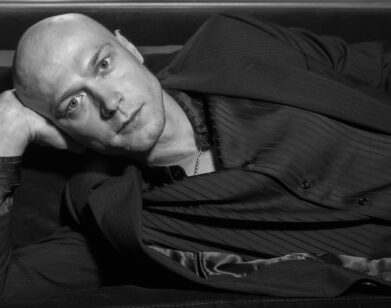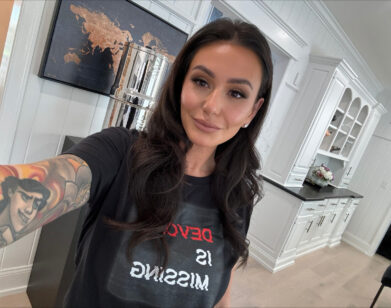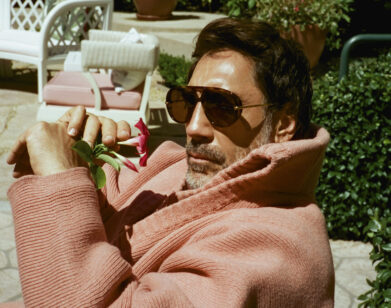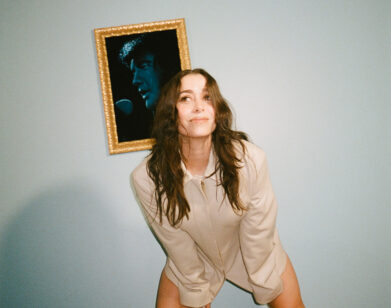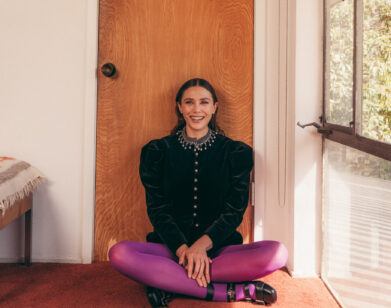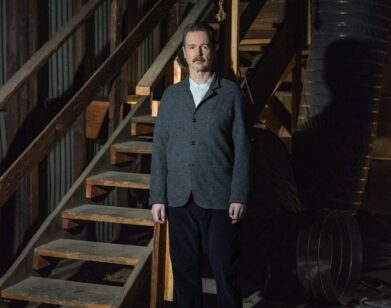Stephen Elliott’s New Direction
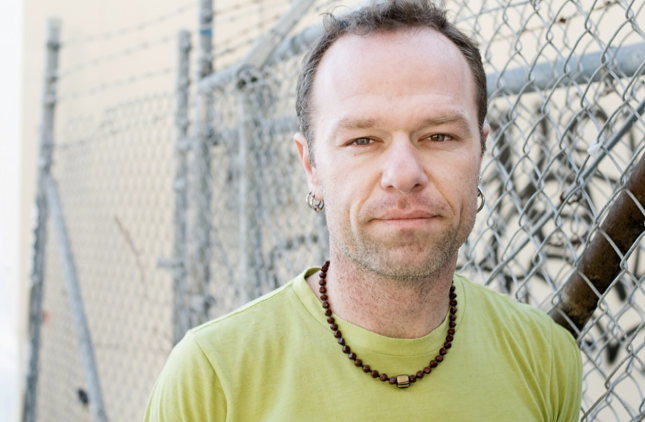
ABOVE: STEPHEN ELLIOTT
Stephen Elliott is a man who likes clean white T-shirts and new socks—simple things, easy to pack or replace. He is often on the move from his base in San Francisco to Los Angeles, to New York, to Berlin and back again in the span of weeks. He finds home in the rooms of friends, friends of friends, or in short-term rentals. Home is a tenuous thing.
Growing up in Chicago, as a teen he was made ward of the state and placed in several group homes. He went on to write seven books, including the sexually explicit story collection My Girlfriend Comes to the City and Beats Me Up, Happy Baby (edited by Dave Eggers), and The Adderall Diaries, which was optioned for screen by James Franco. In 2001 he was awarded the Stegner Fellowship from Stanford University. He also founded the popular literary website The Rumpus.
On an unseasonably warm winter day, we sat down in a Williamsburg coffee shop to chat with Elliott about the making of his first film, Cherry, which stars James Franco, Heather Graham, Lili Taylor, Dev Patel, and Ashley Hinshaw. What follows is our conversation about storytelling, how to shoot a sex scene with Heather Graham, and the scrap heap of backstory.
JENNIFER SKY: On February 16, your first film, Cherry, is going to premiere at the Berlin Film Festival. What drew you from being an author into film?
STEPHEN ELLIOTT: James Franco had optioned the rights to The Adderall Diaries, and so I wrote the script for him. It took about three weeks for him and his people to get back and let me know that they liked the script. I knew even then that that wasn’t going to work for me, you know, that I needed to have more control over the process, so that I wasn’t waiting for other people to call me and tell me that things were okay and that they were moving forward.
I really enjoyed writing the Adderall Diaries script; it really opened me up to this whole new kind of format of writing. I had no idea that scriptwriting would be so enjoyable, but it really was. So I just kind of kept going, and I wrote this script Cherry with my friend Lorelei Lee. I always wanted to write something about kink.com, this porn facility in San Francisco. It’s the largest porn studio in the world.
I was originally looking for a director. I couldn’t get anybody proven, so if I was going to find a director, it was going to be somebody unproven. It might be somebody great, but it’d be risky. So ultimately I realized it would be easier to direct it myself rather than try to communicate the story to an unproven director. If I was going to take a risk on somebody it might as well be me. And so I decided to direct it, so that’s how it happened.
SKY: You went to film school, right?
ELLIOTT: I did go to film school when I was 24. I did a Master’s in Cinema Studies. It wasn’t an MFA, it wasn’t a production degree, it was more like a slacker degree for someone who wasn’t ready to go out and get a job. I had some scholarship money and stuff, so I spent a year doing a Master’s Degree in Cinema studies. It’s funny, because I don’t see much of a connection between that and this movie. That 16 years later I ultimately directed a movie—I mean, there was no moviemaking or interaction with the film industry during those 16 years. I never had any intention of becoming a director. I didn’t have some dream to be a director.
SKY: But it’s storytelling. Do you think that being an author ultimately led you to become a director?
ELLIOTT: I think writing books is great practice for directing. A lot of the most important skills you would need as a director, you get writing books and publishing them, because when you publish books, maybe you get a good review in The New York Times and a bad review in The Wall Street Journal. You learn from writing that some people like your books and some people don’t. And when you’re making a movie, you have a lot of people around you and you have to make creative decisions, and some of those people are not going to agree with those decisions and sometimes they’re right, sometimes they’re right but not right for you. Sometimes they’re just wrong. The ability to accept criticism without falling to pieces and to allow good ideas to come into the process without following every idea that everybody offers up and thereby losing the continuity of the voice, that’s something you definitely learn writing books. You get a sense of what you like, it doesn’t make it right, but you need to have some core that allows you to say no: “I respect your opinion, but this is what I’m going to do.” If you can’t do that, you can’t make a movie. So that’s key.
The other thing about writing books is, as a writer, you know a lot about the characters. I’m used to writing books that are 200 pages long, but there are 1000 pages that I’ve written that I’m not publishing, they’re just in the scrap heap. There’s all this history and all these characters; and that’s really helpful when you’re directing a movie, you have all the back-story on all these characters and situations that aren’t in the script. You have thought through the script much further than just what’s on the pages. The primary job of the director during production, and maybe throughout everything, is to be in charge of what the scene is about, and nobody will ever question you on that. That is the one thing that is entirely your job. The actors might know their characters better than you know them, even if you wrote them, and the cinematographer will certainly know how to do better lighting and camera set-ups than you will, and the editor will know how to fix certain things, but you are in charge of what the scene is about, and writing books is really good practice for that.
SKY: Can you describe a day on set?
ELLIOTT: I think that the time in production, and the two weeks before, was the happiest time in my life. It’s just an incredibly creative time when you know you’re going to make a film, and you’re making these hugely creative decisions and every decision is so important and you don’t have time, there’s no re-thinking, there’s no revision, and this whole giant apparatus moves with you and executes, and it’s painting this incredible canvas. It’s military in its precision, kind of beautiful and stunning to behold. You’re working with all these ridiculously creative people all the time so you’re getting that.
I thought that a movie was a percentage of a screenplay. A screenplay was like 100, and a good movie would be like an 80. I was surprised to find out the movie was better than the screenplay, so that was kind of a shocking discovery, that because of the actors and the rest of the crew, but especially because the actors, the movie was actually better than the movie that Lorelei and I wrote. That was a shock.
SKY: I heard whispers of a Heather Graham rape scene?
ELLIOTT: There is a scene between Heather Graham and her girlfriend Gillian, played by Diane Farr. It’s breakup sex, and it’s very violent, and it certainly borders on rape. I’m not sure I would call it rape. It’s on the line. I actually had them prepare for it by watching a porn. That whole scene is based on a porn that I saw. I showed the porn to Heather and Diane before the scene, and they watched it like four times, they just kept watching it. I think it was a very unorthodox style of directing, to have your actresses watch porn for doing their scene.
SKY: What happened in the scene?
ELLIOTT: It’s graphic, but it’s not graphic. You don’t see pubic hair or anything like that. It’s shot from the side, you know, you don’t actually see any nudity in that scene. You might think you do, but you don’t. It’s a very, very intense scene and I think it’s a scene that will shock a lot of people, because Heather and Diane just went for it. I thought it was going to take us all day to do that scene, and then they were like, “Let’s just go for it,” and they did it in like 20 minutes. It [was] like, “Okay, that just happened,” and then they were done. It was pretty amazing.
SKY: That sounds ideal. Do you plan on working on another film project?
ELLIOTT: Yeah, definitely. The main thing I want to do right now is make another movie. I don’t think there’s anything more fun than making a movie.
CHERRY PREMIERES IN BERLIN ON THURSDAY. FOR MORE OF STEPHEN ELLIOTT’S WORK, VISIT THE RUMPUS OR HIS WEBSITE.

